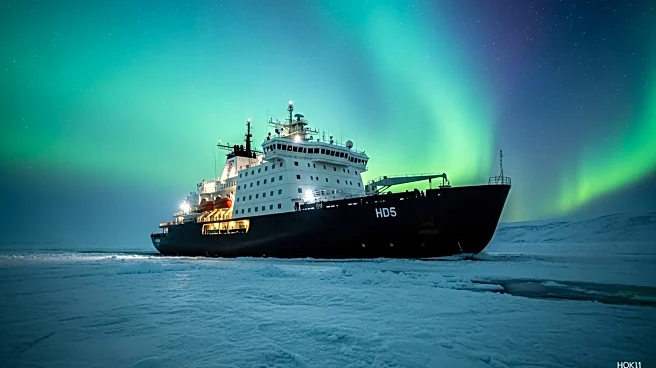What's Happening?
President Trump has announced a deal with Finland to acquire four icebreaker ships, enhancing the U.S. military presence in the Arctic. The agreement, revealed during a meeting with Finnish President Alexander Stubb, includes plans to construct up to seven additional icebreakers in U.S. shipyards using Finnish expertise. This initiative aims to counteract growing Russian and Chinese influence in the region. The total cost for up to 11 icebreakers is estimated at $6.1 billion, with the first expected by 2028. The U.S. Coast Guard, which recently commissioned its third icebreaker, will oversee these operations. The deal underscores the strategic importance of the Arctic, especially following Finland's accession to NATO.
Why It's Important?
The Arctic region is increasingly becoming a focal point for geopolitical competition, with Russia and China expanding their presence. The U.S. aims to bolster its capabilities to maintain strategic balance and protect its interests. The icebreaker deal signifies a commitment to enhancing military readiness and infrastructure in the Arctic. This move could strengthen U.S. alliances, particularly with NATO members, and ensure a robust response to potential threats. The collaboration with Finland leverages their Arctic expertise, which is crucial for effective operations in the challenging environment.
What's Next?
The implementation of the icebreaker program will require careful management to avoid budget overruns and delays. The U.S. must ensure it has the necessary personnel and resources to execute the plan efficiently. As the Arctic becomes more accessible, the U.S. may need to expand its military infrastructure and partnerships in the region. Continued monitoring of Russian and Chinese activities will be essential to adapt strategies accordingly. The success of this initiative could influence future U.S. defense policies and international collaborations.
Beyond the Headlines
The Arctic's strategic importance extends beyond military considerations, impacting environmental and economic interests. The region's resources and shipping routes are vital for global trade, necessitating sustainable management. The U.S. must balance military objectives with environmental protection, ensuring long-term stability. This development could also prompt discussions on international Arctic governance and cooperation.










